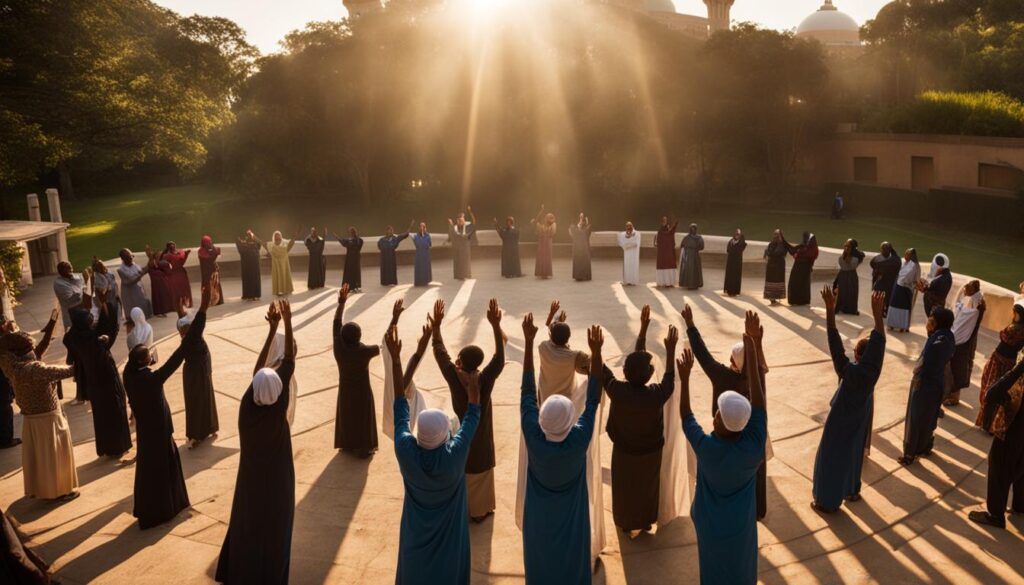The Quran, the holy book of Islam, emphasizes the importance of prayer. Referred to as Salat in Arabic, prayer serves as a means of connection with Allah and a source of guidance for Muslims. Understanding where prayer is mentioned in the Quran provides deeper insight into its significance and the commandments related to it.
Key Takeaways:
- Prayer, known as Salat, holds great importance in Islam.
- The Quran mentions various categories of people who observe the Contact Prayers.
- Prayer serves to prohibit evil, keep God in mind, and seek help from Allah.
- The Quran emphasizes the significance of the Qiblah (direction of prayer) and righteousness defined by prayer.
- Performing prayer in Islam involves specific steps and acts of worship.
The Method of Performing Prayer in Islam
Performing prayer, also known as Namaz or Salah in Islam, involves a specific method that allows Muslims to establish a direct connection with Allah and seek His guidance and blessings. The act of prayer is considered a fundamental act of worship and holds great importance in the lives of Muslims.
To perform prayer, a Muslim must first complete ablution, known as wudu. This involves washing the hands, face, arms, and feet with pure water, symbolizing purification and spiritual cleansing. Ablution is necessary to ensure physical and spiritual cleanliness before engaging in prayer.
Once ablution is complete, the worshipper must face the Qiblah, which is the direction of the Kaaba in Mecca, Saudi Arabia. Directing our prayers towards the Kaaba symbolizes the unity of the Muslim community and the connection with the birthplace of Islam.
Steps Involved in Praying:
- Make a sincere intention: Before starting prayer, it is important to have a sincere intention to worship Allah alone and seek His pleasure.
- Recite the opening supplication: Begin the prayer by reciting the opening supplication, known as the Takbeer. This serves as a proclamation of the greatness of Allah.
- Follow the sequences of standing, bowing, and prostrating: The prayer involves specific sequences of standing, bowing, and prostrating while reciting portions of the Quran and specific supplications.
- Conclude with the salutation: End the prayer by turning the head to the right and left, expressing peace and salutation to the angels on each shoulder.
The method of performing prayer in Islam is designed to create a deep sense of reverence, focus, and humility before Allah. It serves as a means of connecting with the Creator and seeking His guidance and blessings in all aspects of life.
The Significance of Duas (Supplications) in Prayer
Prayer in Islam is not only a means of establishing a connection with Allah, but also an opportunity for believers to seek His guidance and blessings. One of the key components of prayer are duas, or supplications, which hold immense significance in the worship experience. Duas are recited during specific moments in prayer, such as while bowing (ruku) and prostrating (sujood), allowing Muslims to express their needs and desires directly to Allah.
The importance of duas in prayer can be understood through their role in fostering a personal relationship with Allah. These supplications serve as a means of communication between the believer and their Creator, allowing them to seek comfort, guidance, and support through their heartfelt pleas. By reciting duas, Muslims acknowledge their dependence on Allah and express their trust in His divine mercy and intervention.
Furthermore, duas provide a profound opportunity for self-reflection and spiritual growth. As believers pour their hearts out to Allah, they engage in deep introspection and self-awareness. Duas encourage Muslims to recognize their weaknesses, seek forgiveness for their sins, and strive for personal improvements. They serve as a reminder of the humility and devotion required in prayer and help believers align their intentions with the teachings of Islam.
“O my Lord! Grant me from You, a good progeny. Indeed, You are the All-Hearer of supplications.” (Quran 3:38)
This verse from the Quran exemplifies the importance of duas and their significance in prayer. It emphasizes the power of supplication in seeking blessings from Allah, including the desire for righteous offspring. The act of reciting duas not only deepens the spiritual connection between the believer and Allah, but also serves as a means of seeking His guidance and blessings in various aspects of life.

Table: Examples of Important Duas in Prayer
| Dua | Translation |
|---|---|
| Rabbana atina fid-dunya hasanatan wafil ‘akhirati hasanatan waqina ‘adhaban-nar | Our Lord, give us the good of this world and the good of the Hereafter and protect us from the torment of the Fire |
| Rabbana hablana min azwajina wadhurriyyatina qurrata ‘ayunin waj’alna lil-muttaqina imama | Our Lord, grant us from among our wives and offspring comfort to our eyes and make us an example for the righteous |
| Rabbana la tuzigh quloobana ba’da idh hadaytana wa hab lana milladunka rahmah innaka antal Wahhab | Our Lord, do not let our hearts deviate after You have guided us and grant us from Yourself mercy. Indeed, You are the Bestower |
The Importance of Reciting Surahs in Prayer
Reciting Surahs, or chapters, from the Quran during prayer is an integral part of the Islamic worship experience. The Quran is considered the word of Allah, and its recitation holds great significance for Muslims. When reciting Surahs during prayer, it not only deepens the spiritual connection with Allah but also serves as a source of guidance and reflection.
Each Surah carries its own message and wisdom, highlighting different aspects of faith and offering insights into life’s challenges and moral dilemmas. Some Surahs focus on the attributes of Allah, while others emphasize the importance of seeking forgiveness and guidance. By reciting Surahs during prayer, Muslims engage in a meaningful conversation with Allah, seeking His mercy, blessings, and wisdom.
The Significance of Surah Al-Fatiha
One of the most notable Surahs recited in every unit of prayer is Surah Al-Fatiha. Also known as “The Opening,” it serves as the opening chapter of the Quran and holds immense significance. Surah Al-Fatiha acts as a comprehensive supplication, encompassing the essence of prayer and acknowledging Allah’s guidance and mercy. It is a foundational Surah that sets the tone for the entire prayer.
“In the name of Allah, the Most Gracious, the Most Merciful. Praise be to Allah, the Lord of all the worlds. The Most Gracious, the Most Merciful. Master of the Day of Judgment. You alone we worship, and You alone we ask for help. Guide us on the Straight Path, the path of those who have received Your grace; not the path of those who have brought down wrath upon themselves, nor of those who have gone astray.” (Quran 1:1-7)
Reciting Surah Al-Fatiha at the beginning of each unit of prayer serves as a reminder of our dependence on Allah’s guidance and mercy. It sets the tone for the rest of the prayer, reminding us of our purpose and seeking Allah’s help in staying on the straight path.
The All-Encompassing Concept of Worship in Islam
In Islam, worship is not limited to specific acts performed in a place of worship. It is a comprehensive concept that encompasses all actions performed with the intention of pleasing Allah and following His guidance. Worship in Islam goes beyond ritual acts such as prayer, fasting, charity, and pilgrimage. It includes everyday tasks performed with God-consciousness and sincerity.
The Quran emphasizes the importance of worship as the purpose of human existence. Muslims strive to lead a life that reflects their devotion to Allah through their thoughts, words, and actions. They seek to align every aspect of their lives with the teachings of Islam and the example set by Prophet Muhammad (peace be upon him).
Through worship, Muslims aim to cultivate a deep connection with Allah and strengthen their faith. It serves as a constant reminder of their dependence on the Creator and their ultimate purpose in life. The act of worship allows Muslims to express their gratitude, seek forgiveness, and seek guidance from Allah.
Worship in Islam is not confined to specific times or places. It is a way of life that encompasses every moment and every action. Whether it is through prayer, acts of kindness, or self-reflection, Muslims strive to engage in worship in every facet of their existence.
Table: Forms of Worship in Islam
| Form of Worship | Description |
|---|---|
| Prayer (Salah) | The ritual act of prayer performed five times a day |
| Fasting (Sawm) | Abstaining from food, drink, and other physical needs from dawn until sunset during the month of Ramadan |
| Charity (Zakat) | Voluntary giving of a certain portion of one’s wealth to those in need |
| Pilgrimage (Hajj) | A journey to the holy city of Mecca, undertaken by Muslims who are physically and financially able |
| Recitation of the Quran | Reading and reflecting upon the words of Allah as revealed in the Quran |
| Kindness and Good Deeds | Acts of compassion, generosity, and service to others |
These forms of worship, along with the continuous remembrance of Allah, help Muslims strengthen their relationship with the Creator and lead a life that is pleasing to Him. The concept of worship in Islam is all-encompassing, guiding Muslims in their actions and intentions, and providing a framework for spiritual growth and development.

Conclusion
In conclusion, prayer holds immense significance in Islam, as highlighted in the Quran. Muslims are obligated to observe the Contact Prayers (Salat) throughout the day, using prayer as a means to maintain a constant connection with Allah.
The method of performing prayer in Islam involves a series of prescribed steps, including ablution, facing the Qiblah, making a sincere intention, reciting specific prayers and verses from the Quran, and concluding with a salutation.
Additionally, the act of supplication (duas) during prayer allows Muslims to express their needs and desires to Allah, forging a personal connection with Him. Reciting Surahs from the Quran further enriches the spiritual experience, providing guidance and reflection.
Ultimately, prayer serves as a comprehensive form of worship in Islam, extending beyond specific acts performed in a place of worship. It encompasses all actions carried out with the intention of pleasing Allah and in accordance with His guidance. By following the teachings of the Quran and the example of Prophet Muhammad (peace be upon him), Muslims strive to lead a life that is pleasing to Allah through prayer and worship.
FAQ
Where is prayer mentioned in the Quran?
The Quran emphasizes the importance of prayer, referred to as Salat in Arabic. The concept of prayer is mentioned throughout the Quran, with various references to the commandments related to prayer, the characteristics of those who observe prayer, and the significance of seeking help through prayer (Quran 2:3, 2:43, 2:45, 2:83, 2:110, 2:135, 2:142, 2:149, 2:150, 2:153, 2:177, 2:238-239, 4:43, 4:77, 4:101, 4:102, 4:142, 4:162, 5:6, 277).
How do Muslims perform prayer in Islam?
Muslims perform prayer, known as Namaz or Salah in Islam, following a specific method. This includes steps such as ablution (wudu), facing the Qiblah (direction of prayer), making a sincere intention, reciting specific prayers and verses from the Quran, and concluding with a salutation (tasleem).
What is the significance of duas (supplications) in prayer?
Duas hold great importance in prayer as they allow Muslims to connect with Allah on a personal level and express their needs and desires. Duas are recited during specific moments in prayer, such as while bowing (ruku) and prostrating (sujood), and can also be made after prayer.
Why is reciting Surahs (Quranic chapters) important in prayer?
Reciting Surahs from the Quran during prayer adds depth and spiritual significance to the worship experience. The Quran is considered the word of Allah, and its recitation during prayer helps establish a direct connection with Allah, enriches the spiritual experience, and provides guidance and reflection.
What is the concept of worship in Islam?
Worship in Islam is not confined to specific acts performed in a place of worship. It is a comprehensive concept that encompasses all actions performed with the intention of pleasing Allah and in accordance with His guidance. Worship in Islam includes ritual acts such as prayer, fasting, charity, and pilgrimage, as well as everyday tasks performed with God-consciousness.








